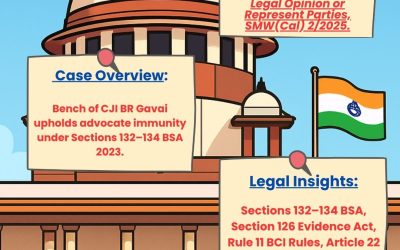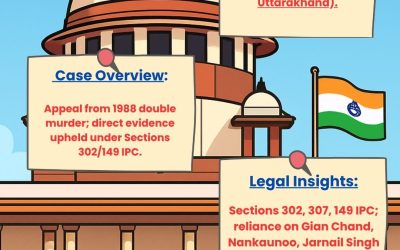
Supreme Court directs strict safeguards to protect lawyers’ digital devices, ensuring client confidentiality and preventing misuse of sensitive data during police investigations under BNSS 2023.
Case in NewsSupreme Court safeguards lawyers’ digital devices from police intrusion, ensuring protection of client confidentiality during criminal investigations under BNSS . |
Discover powerful Latin Maxims and simplify complex legal terms in seconds.
Case Overview
A Bench comprising Chief Justice of India BR Gavai, and Justices K Vinod Chandran and NV Anjaria of the Supreme Court of India addressed a significant concern relating to the seizure of lawyers’ digital devices during criminal investigations . The case was taken up suo motu to ensure that lawyers’ professional duties and the confidentiality of their clients are not compromised during police actions . The Bench examined the application of Section 94 of the Bharatiya Nagarik Suraksha Sanhita, 2023 (BNSS) which corresponds to Section 91 of the Code of Criminal Procedure, 1973 (CrPC) .
Step into the world of justice with Courtroom Chronicles
Key Aspects
The Supreme Court recognized that lawyers’ digital devices contain sensitive information concerning multiple clients and must be handled with extreme caution . To maintain professional ethics and privacy, the Court established procedural safeguards .
- Police authorities can require the production of a lawyer’s digital device only before the jurisdictional court .
- The court must issue notice to both the advocate and the concerned party before deciding on access .
- The hearing must include both parties to allow objections related to production, discover, and admissibility .
- If objections are overruled, the device shall be opened only in presence of the lawyer, client and a digital expert .
- Confidentiality concerning other clients must remain unaffected during the examination process .
Legal Insights
The Court’s ruling is rooted in the protection of privacy and professional privilege . It clarifies the extent of police powers under Section 94 of the BNSS, 2023, which allows for the production of documents or electronic devices for investigation, subject to judicial oversight .
- Section 94, BNSS 2023: Permits the production of documents or devices necessary for investigation, but only through a judicial process ensuring that personal rights are not violated .
- Article 21 of the Constitution of India: Guarantees the Right to Privacy, which includes digital privacy of individuals, including advocates .
- Section 126 of the Indian Evidence Act, 1872: Protects professional communications between lawyers and clients from disclosure .
- Section 35 of the Advocates Act, 1961: Mandates adherence to professional ethics and confidentiality, forming the basis of the lawyer-client relationship .
These provisions collectively reinforce the Supreme Court’s emphasis on balancing the needs of investigation with the protection of professional privilege .
Court’s Verdict
The Supreme Court of India directed that any lawyer’s digital device, when required by investigating agencies, must be produced only before the jurisdictional court . The court must ensure that the lawyer, client and a digital expert are present during any examination . Additionally, it ordered that discovery must be confined strictly to the information relevant to the investigation ensuring that confidentiality of other clients remains intact, thus preserving the sanctity of the lawyer-client relationship .
Source – Supreme Court of India
Read also – Constitution of India
The LawGist ensures exam success with quality notes—TPL, Current Affairs, Recent Judgments, and more. Backed by trusted resources and videos, The LawGist is every aspirant’s first choice. Discover more at thelawgist.org







